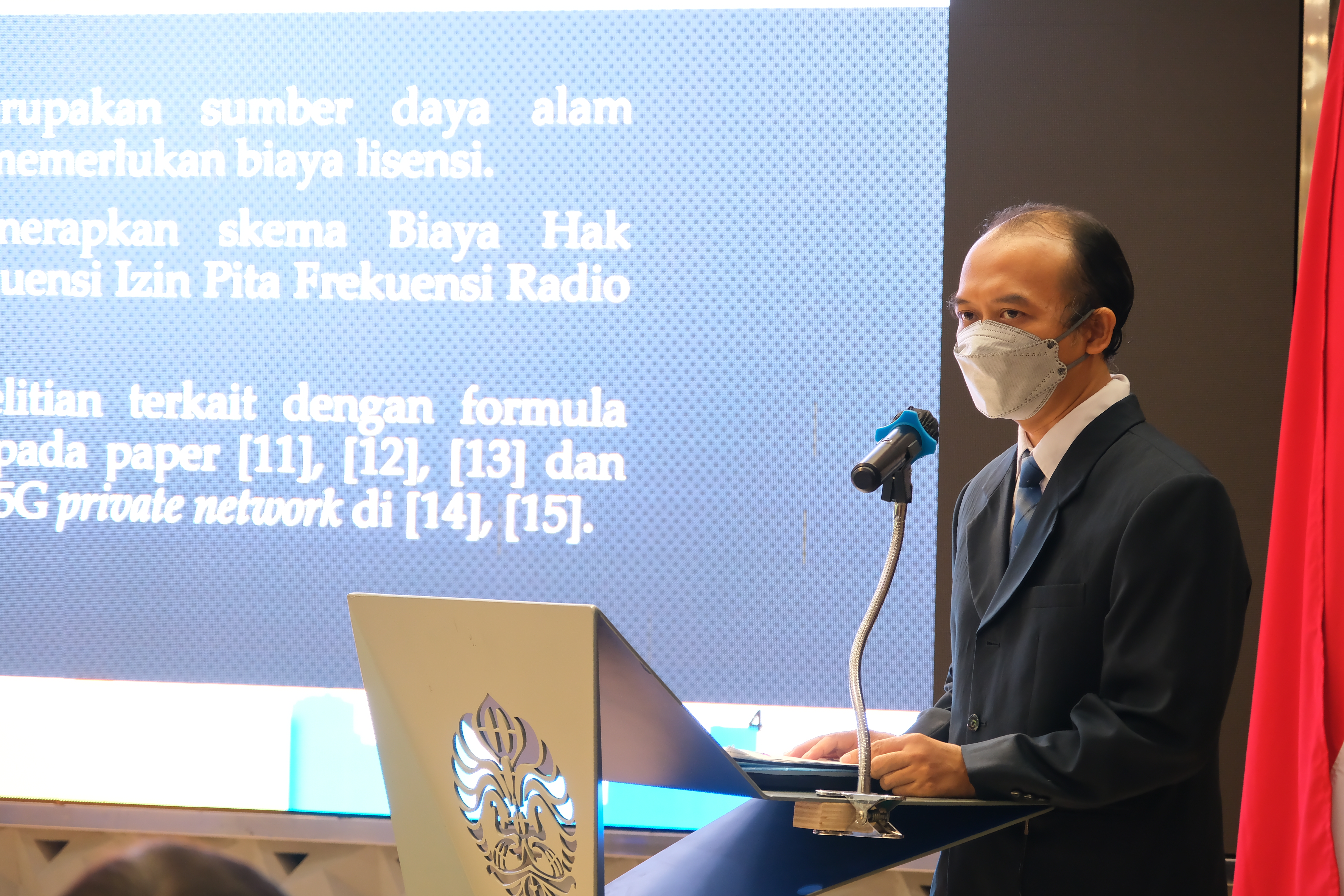Currently, the calculation of the cost of using the network spectrum when applied to the 5G-mm-Wave private network will bring consequences in the form of extreme prices for cellular operators. This was revealed by Alfin Hikmaturokhman in his dissertation presentation at the Open Session of Doctoral Promotion at the Department of Electrical Engineering, FTUI (05/07). Alfin defended his research dissertation with the title “Development of a New Formula for Fees for Use of Rights (BHP) for the Frequency of 5G-mm-Wave Private Network 26/28 GHz in Indonesian Industrial Estates”.
The cost of using Indonesia’s spectrum, which is known as the Radio Frequency Band License Frequency User Rights Fee (BHP-IPFR), is currently calculated based on a formula determined by three main parameters, namely frequency band, state economic parameters, and national population. The cost of using a spectrum that is proportional to the bandwidth will result in BHP-IPFR at an extreme price if applied to a 5G-mm-Wave private network. This will bring consequences in the form of costs for cellular operators.
However, there are potential advantages of 5G-mmWave private networks in industrial estates. Namely, a 5G-mmWave private network (26/28 GHz) with a bandwidth of 100 MHz can provide smaller coverage so that it can be a perfect technology platform for operations and production lines in factories.
“The method I use in this dissertation is to evaluate the existing formula, adopt the ITU-R SM.2012-5 (06/2016) framework, and use an industry reference index, called the Indonesia Industry Readiness Index 4.0 (INDI 4.0) score. said Alfin.
From this method, Alfin then tested his new formula to calculate the cost of deploying a 5G-mmWave private network in Jakarta’s industrial area. The results show that the new formula will always provide an 8% lower cost of spectrum usage than the current formula. This will certainly provide benefits for 5G cellular operators in making savings which can then provide greater economic benefits.
Using the national and regional Input-Output model for DKI Jakarta Province, Alfin proved that this new formula will have a greater impact on economic output for the national (Indonesian) and regional DKI Jakarta Provinces. The percentage of national economic output will increase by 0.244% for Pulogadung and 0.336% for KBN, while the percentage of regional economic output in DKI Jakarta Province will increase by 23.65% for Pulogadung and by 32.59% for KBN.
“The application of this new formula will provide a multiplier effect in various sectors and encourage digital economic growth and national digital transformation, especially for vertical industries in Indonesia. The contribution of this research can not only be used as a guideline or initial reference for policymakers and cellular operators in Indonesia but can also be used as a benchmark case for other countries with the same case,” continued Alfin.
Alfin Hikmaturokhman managed to get a doctorate with a cum-laude predicate at the promotion session which was held on July 5, 2022. He is the 142nd graduate of the Department of Electrical Engineering and the 461st doctoral graduate of the Faculty of Engineering, Universitas Indonesia. The session was chaired by Prof. Dr. Ir. Riri Fitri Sari, M.M., M.Sc. with the Promoter Prof. Dr.-Ing. Ir. Kalamullah Ramli, M.Eng.; Co-Promoter Dr. Muhammad Suryanegara, S.T., MSc., IPU. The board of examiners consists of Prof. Dr. Ir. Dadang Gunawan, M.Eng.; Ajib Setyo Arifin, S.T., M.T., Ph.D.; Ibrahim Kholilul Rohman, S.E., M.SE., Ph.D.; Dr. Yohan Suryanto, S.T., M.T.; and Dr. Ir. Ismail, M.T.
***
Public Communication Bureau
Faculty of Engineering, Universitas Indonesia

